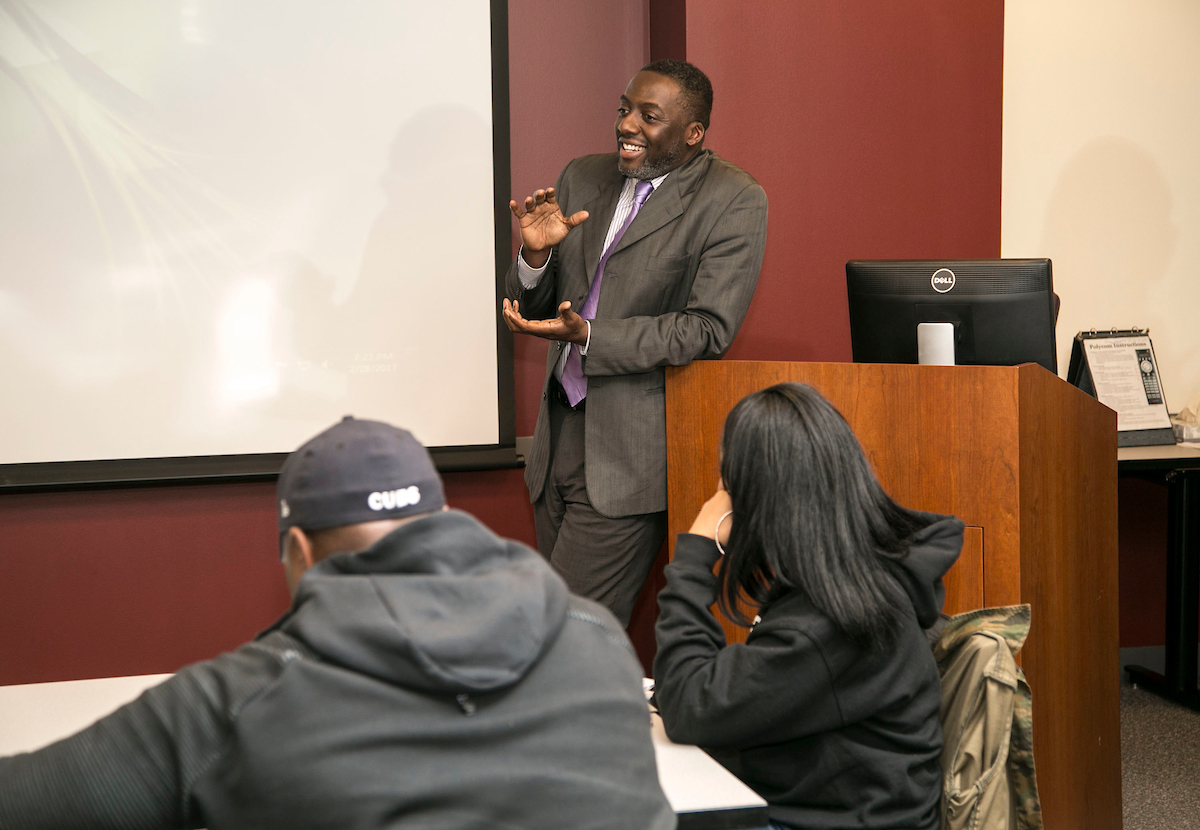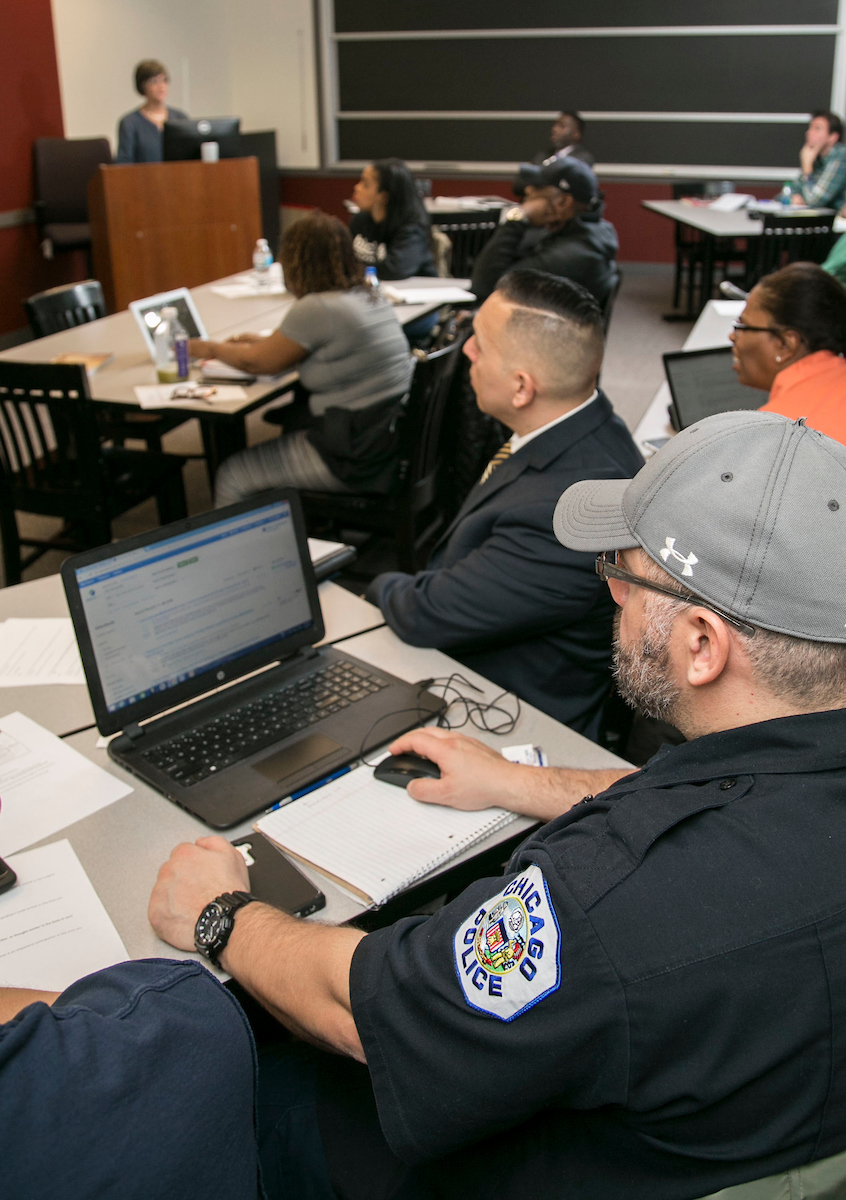 At the university library in the Loop Campus, adjunct faculty member Leodis Scott talks about future assignments with Fraternal Order of Police students in the Educational Leadership Ed.D. program. Faculty teach all regular classes at the Chicago Police Academy, but students in the program have access to DePaul learning resources, including the libraries. (DePaul University/Jamie Moncrief)
At the university library in the Loop Campus, adjunct faculty member Leodis Scott talks about future assignments with Fraternal Order of Police students in the Educational Leadership Ed.D. program. Faculty teach all regular classes at the Chicago Police Academy, but students in the program have access to DePaul learning resources, including the libraries. (DePaul University/Jamie Moncrief)
Tom Murphey has served as a Chicago police officer for 25 years, but he's always had a passion for teaching. When presented with the opportunity to pursue a Doctorate of Education through DePaul's program with the Fraternal Order of Police, he jumped at the chance. His ultimate goal: teach in a university so that he can share the hands-on knowledge he has gained as a police officer.
"I had been waiting for the right time to get back in the classroom," Murphey says. "The classes have allowed me to see, hear and witness another side of the city that I don't get to experience as a police officer."
In a continued effort to connect with the Chicago community, DePaul's Corporate and Employer Outreach team collaborated with the Fraternal Order of Police to develop programs for law enforcement professionals to earn their bachelor's, master's or doctoral degree.
 Law enforcement professionals learn in cohorts through the collaboration with DePaul. Students begin and complete the program at the same time. (DePaul University/Jamie Moncrief)
Law enforcement professionals learn in cohorts through the collaboration with DePaul. Students begin and complete the program at the same time. (DePaul University/Jamie Moncrief)
"Students can complete their degrees through the DePaul Law School, School for New Learning or the College of Education," says Suzanne Depeder, associate vice president of graduate and adult admission in Enrollment Management and Marketing. "They can pursue a degree in jurisprudence or masters of public administration - all from the convenience of the police academy. Students are able to incorporate their work experience, and their classes are delivered at the academy to fit their work schedule."
DePaul faculty teach all classes in the Fraternal Order of Police program at the Chicago police academy. Although classes are not on the DePaul campuses, students still have access to all university resources, such as the university's libraries.
"Having classes for the Fraternal Order of Police members at the police academy is a comfortable setting for officers where they feel safe to interact with one another," says Leodis Scott, adjunct faculty member in the School for New Learning. "There is a sense of familiarity and closeness through having a central learning location."
DePaul designs the classes as a cohort model, where a group of students begins and ends the program as one unit. One cohort, typically 20 students per section, take the same two-night-per-week classes each quarter, starting and ending the entire program together.
Scott is one of the faculty members who lectures at the police academy.
"I have taught a variety of classes such as leadership, accountability and quantitative research methods all with the same cohort," Scott says. "This learning model of working with the same students, quarter after quarter, is my favorite part of teaching in the Fraternal Order of Police program."
With nearly 100 officers enrolled, often times students in the program have the opportunity to meet new people that they work alongside everyday but don't know very well, Scott explains.
"Learning in a cohort style allows the officers to build a sense of comradery and bring a level of accountability to one another," he says. "As they move through each course, they motivate one another through their degree process."
Law enforcement professionals come into the program with various levels of experience, but are all dedicated to the same educational goal.
"It is so rewarding as an educator to build relationships with students through teaching multiple courses with the same group," Scott says. "I get to know the students better in order to support and guide their professional interests, all while helping to connect their professional and academic worlds."
For Murphey, who will complete his degree in 2018, learning as part of a cohort is one of the biggest assets of the program
"Our cohort has a sense of comradery between one another," Murphey says. "We all have similar experiences and goals, but hearing how everyone thinks, and feels differently is what brings so many diverse perspectives into the classroom."
Looking forward, DePaul expects the program to continue to grow.
"I hope that the program will attract more officers, hopefully increasing the frequency of cohorts," Depeder says. "We are excited to see this program continue to expand."